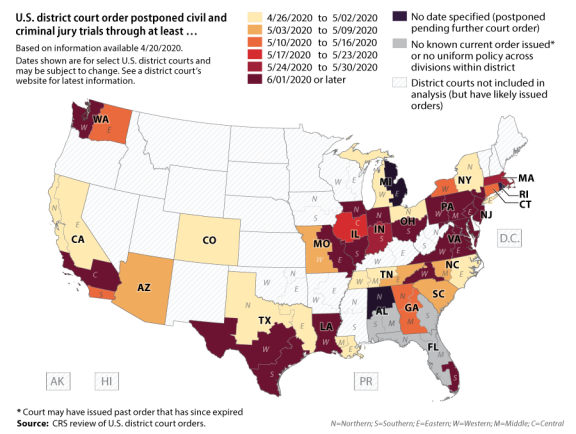Federal Jury Trials and COVID-19
This Insight provides information and analysis related to federal jury trials and how such trials have been impacted by Coronavirus disease 2019, or COVID-19. Given the rapidly changing situation surrounding COVID-19, the information provided in this Insight may be superseded by new information that differs from what is described in the text below. If there are any questions regarding whether such changes have occurred, congressional staff may contact the author of this Insight.
Background
The Jury Selection and Service Act of 1968 specifies the qualifications a person must meet in order to serve on a federal jury. Specifically, an individual must be a United States citizen; be at least 18 years of age; reside primarily for one year in the judicial district where he or she has been summoned to federal jury service; be adequately proficient in English to satisfactorily complete the juror qualification form; have no disqualifying mental or physical condition; not currently be subject to felony charges punishable by imprisonment for more than one year; and never have been convicted of a felony (unless his or her civil rights have been legally restored).
Each U.S. district court is responsible for summoning eligible individuals within its district for jury service. The type of jury addressed by this Insight is a trial jury, also known as a petit jury. Such federal juries consist of 6 to 12 people and decide, in a criminal case, whether the defendant committed the crime as charged or, in a civil case, whether the defendant injured the plaintiff.
Court Orders Postponing Jury Trials
During the COVID-19 national emergency, most U.S. district courts have postponed, or "continued," civil and criminal jury trials. Such a continuance is announced by court order and signed by the chief judge of the district court. A court's order typically includes the specific time period for which jury trials are continued and is often posted on the court's website.
The order often provides an explanation as to why the court decided to postpone jury trials. Examples from recent court orders include the following:
- District of Alaska (March 30, 2020): The court found that criminal jury trials are currently impractical because "petit juries ... are drawn from disparate, often remote, communities throughout [Alaska], which may require some jurors to travel to Anchorage by airplane. Additionally, throughout the proceedings, jurors would be required to sit close to other jurors in the jury box and deliberation room." The court also postponed civil jury trials.
- Eastern District of Arkansas (March 18, 2020): The court, in postponing criminal jury trials, noted that such trials "could put defendants, jurors, observers, and court personnel at risk; and there is no way to ensure that a jury's important work would not be affected by health concerns." The court also postponed civil jury trials.
- District of Delaware (March 18, 2020): The court described a number of factors in its order postponing civil and criminal jury trials—including the significant distances traveled by many potential jurors and witnesses; school closures that would make it difficult for parents to comply with summonses for jury service; and the uncertainty of the health status of summoned jurors because of current limitations on COVID-19 testing.
As described by the Administrative Office of U.S. Courts, most of the 94 federal district courts are able to communicate quickly and reliably with jurors regarding the postponement of trial proceedings. Courts "use the Integrated Voice Response system, an automated messaging system that can send email alerts, phone calls, and text messages informing jurors of ... changes in service."
Status of Jury Trials for Select U.S. District Courts
As of April 19, 2020, the 25 states with the greatest number of known COVID-19 cases are (listed in descending order by number of known cases) New York, New Jersey, Massachusetts, Pennsylvania, California, Michigan, Illinois, Florida, Louisiana, Texas, Georgia, Connecticut, Maryland, Washington, Ohio, Indiana, Colorado, Virginia, Tennessee, North Carolina, Missouri, Arizona, Alabama, Rhode Island, and South Carolina.
There are 56 U.S. district courts that serve these 25 states—each judicial district has its own U.S. district court, and some states, like California and Louisiana, have more than one judicial district (and, consequently, more than one district court). Figure 1 shows, for these 56 district courts, whether jury trials have been postponed and, as of this writing, the earliest date by which jury trials will be conducted again by a district court. This figure is for illustrative purposes—congressional staff can contact the author of this Insight if they have questions about the status of jury trials for a particular district court.
As shown by the figure, a plurality (20 of 56, or 36%) of the district courts included in Figure 1 have postponed jury trials until June 1, 2020, or later. Of courts that have provided a date on which jury trials could be resumed, the Southern District of Florida has, at present, specified the latest date (July 6, 2020).
Of the 56 district courts included in the figure, there are three for which CRS is unable to locate a current court order addressing jury trials in the district (prior orders by at least two of these courts delayed jury trials through some date prior to April 20, 2020). At least one district court does not have a uniform policy for the divisions within its judicial district. Specifically, in the Middle District of Florida, the Orlando division has stated it will resume jury trials on a later date than the Fort Myers and Jacksonville divisions.
Three district courts included in the figure—the Eastern District of Michigan (with its main courthouse in Detroit), the Northern District of Alabama, and the District of Rhode Island—have postponed jury trials but have not identified a date on or after which such trials will resume.
|
Figure 1. Status of Federal Jury Trials in 25 States with |
 |